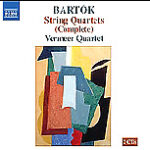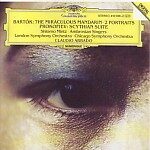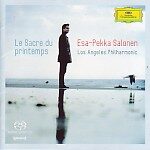

This enticing collection for the most part contains very fine performances by the piano duo Quattro Mani. Best of all is the Milhaud Concerto No.

In Bartók’s first two quartets, the Párkányi Quartet does its finest work in slow moving, introspective passages. For example, although the composer writes “molto espressivo”

Within a short time after its formation in 1992, the Rubin Quartet quickly emerged as a potent contender among Europe’s young chamber ensembles. These four

ECM’s excellent booklet notes mention that Bartók wrote his Fourth Quartet in 1928, not long after hearing Alban Berg’s Lyric Suite. Five years later Karl

Solid performances and sonic excellence place the Vermeer Quartet’s Bartók Quartets near the top among budget-priced recommendations. At times, you might take issue with first

This release is a mixed bag. There’s no question about the quality of the performances, which is excellent. The Sonata has plenty of atmosphere and

Kossuth is so exciting that you really wonder why it isn’t played more often. Not much longer than Strauss’ Don Juan, and just as ebulliently

On the whole, these are very exciting, powerful performances. The Miraculous Mandarin has divided critical opinion, some enjoying the swift tempos and Abbado’s sensitivity to

Bartók’s Mikrokosmos (“Little Worlds”) consists of 153 teaching pieces, divided into six books of progressive difficulty. Books 1 through 3 mainly serve pedagogical purposes, while

Wow, this is some disc! There are so few new major-label productions featuring today’s “big” artists–and let’s face it, so many of those turn out
![]()
